 W
WScott Joel Aaronson is an American theoretical computer scientist and David J. Bruton Jr. Centennial Professor of Computer Science at the University of Texas at Austin. His primary areas of research are quantum computing and computational complexity theory.
 W
WPaul A. Benioff is an American physicist who helped pioneer the field of quantum computing. Benioff is best known for his research in quantum information theory during the 1970s and 80s that demonstrated the theoretical possibility of quantum computers by describing the first quantum mechanical model of a computer. In this work, Benioff showed that a computer could operate under the laws of quantum mechanics by describing a Schrödinger equation description of Turing machines. Benioff's body of work in quantum information theory has continued on to the present day and has encompassed quantum computers, quantum robots, and the relationship between foundations in logic, math, and physics.
 W
WGilles Brassard, is a faculty member of the Université de Montréal, where he has been a Full Professor since 1988 and Canada Research Chair since 2001.
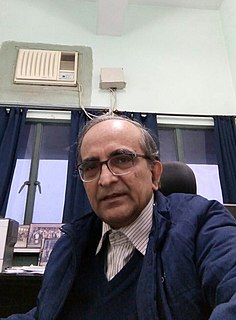 W
WBikas Kanta Chakrabarti is an Indian physicist. Since January 2018, he is emeritus professor of physics at the Saha Institute of Nuclear Physics, Kolkata, India.
 W
WJuan Ignacio Cirac Sasturain, known professionally as Ignacio Cirac, is a Spanish physicist. He is one of the pioneers of the field of quantum computing and quantum information theory. He is the recipient of the 2006 Prince of Asturias Award in technical and scientific research.
 W
WNike Dattani is a scientist known for breaking the world-record for largest number factored on a quantum device in 2014. He is also known for co-inventing the Morse/Long-range potential energy function, and for inventing several novel methods for quadratization of high-degree discrete optimization problems into quadratic problems which are much easier to solve.
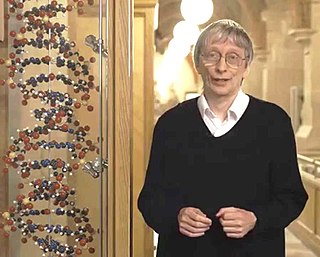 W
WDavid Elieser Deutsch is a British physicist at the University of Oxford. He is a Visiting Professor in the Department of Atomic and Laser Physics at the Centre for Quantum Computation (CQC) in the Clarendon Laboratory of the University of Oxford. He pioneered the field of quantum computation by formulating a description for a quantum Turing machine, as well as specifying an algorithm designed to run on a quantum computer. He has also proposed the use of entangled states and Bell's theorem for quantum key distribution and is a proponent of the many-worlds interpretation of quantum mechanics.
 W
WJonathan P. Dowling was an Irish-American researcher and professor in theoretical physics, known for his work on quantum technology, particularly for exploiting quantum entanglement for applications to quantum metrology, quantum sensing, and quantum imaging.
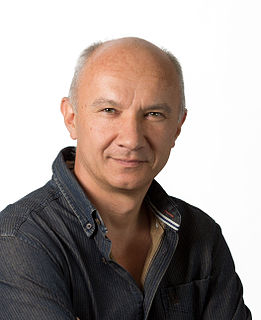 W
WArtur Konrad Ekert FRS is a Polish-born British professor of quantum physics at the Mathematical Institute, University of Oxford, professorial fellow in quantum physics and cryptography at Merton College, Oxford, Lee Kong Chian Centennial Professor at the National University of Singapore and the founding director of the Centre for Quantum Technologies (CQT). His research interests extend over most aspects of information processing in quantum-mechanical systems, with a focus on quantum communication and quantum computation. He is best known as one of the pioneers of quantum cryptography.
 W
WEdward Fredkin is a distinguished career professor at Carnegie Mellon University (CMU), and an early pioneer of digital physics.
 W
WNeil Adam Gershenfeld is an American professor at MIT and the director of MIT's Center for Bits and Atoms, a sister lab to the MIT Media Lab. His research studies are predominantly focused in interdisciplinary studies involving physics and computer science, in such fields as quantum computing, nanotechnology, and personal fabrication. Gershenfeld attended Swarthmore College, where he graduated in 1981 with a B.A. degree in physics with high honors, and Cornell University, where he earned his Ph.D.in physics in 1990. He is a Fellow of the American Physical Society. Scientific American has named Gershenfeld one of their "Scientific American 50" for 2004 and has also named him Communications Research Leader of the Year. Gershenfeld is also known for releasing the Great Invention Kit in 2008, a construction set that users can manipulate to create various objects.
 W
WAlexander Holevo(Russian: Алекса́ндр Семéнович Хóлево, also spelled as Kholevo and Cholewo) is a Soviet and Russian mathematician, one of the pioneers of quantum information science.
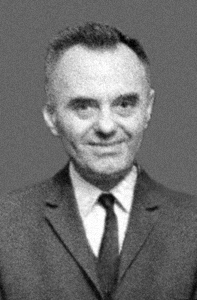 W
WRoman Stanisław Ingarden was a Polish physicist, specialised mainly in optics and statistical mechanics, son of the Polish philosopher Roman Witold Ingarden.
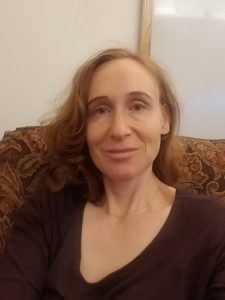 W
WJulia Kempe is a French, German, and Israeli researcher in quantum computing. Kempe was born in East Berlin to a Russian family. She was educated in Austria, Australia, France, and the US. She is currently the Director of the Center for Data Science at NYU and Professor at the Courant Institute
 W
WSeth Lloyd is a professor of mechanical engineering and physics at the Massachusetts Institute of Technology.
 W
WDaniel Loss is a Swiss theoretical physicist and a professor of Theoretical Condensed Matter Physics at the University of Basel and RIKEN. With David P. DiVincenzo, he proposed the Loss-DiVincenzo quantum computer in 1997, which would use electron spins in quantum dots as qubits.
 W
WYuri Ivanovich Manin is a Russian mathematician, known for work in algebraic geometry and diophantine geometry, and many expository works ranging from mathematical logic to theoretical physics. Moreover, Manin was one of the first to propose the idea of a quantum computer in 1980 with his book Computable and Uncomputable.
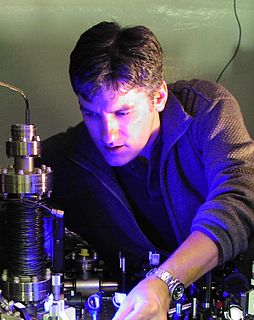 W
WChristopher Roy Monroe is an American physicist, an experimentalist in the areas of atomic, molecular, and optical physics and quantum information science. He directs one of the leading research efforts in ion traps and quantum optics. Monroe is the Bice Zorn Professor and a Distinguished Professor of Physics at the University of Maryland and Fellow of the Joint Quantum Institute. Beginning in January 2021, he will be a Professor of Electrical and Computer Engineering and Physics at Duke University.
 W
WMichael Aaron Nielsen is a quantum physicist, science writer, and computer programming researcher living in San Francisco.
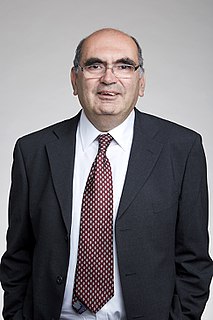 W
WSandu Popescu is a Romanian-British physicist working in the foundations of quantum mechanics and quantum information.
 W
WJohn Phillip Preskill is an American theoretical physicist and the Richard P. Feynman Professor of Theoretical Physics at the California Institute of Technology, where he is also the Director of the Institute for Quantum Information and Matter.
 W
WRobert J. Schoelkopf III is an American physicist, most noted for his work on quantum computing as one of the inventors of superconducting qubits. Schoelkopf's main research areas are quantum transport, single-electron devices, and charge dynamics in nanostructures. His research utilizes quantum-effect and single-electron devices, both for fundamental physical studies and for applications. Techniques often include high-speed, high-sensitivity measurements performed on nanostructures at low temperatures. Schoelkopf serves as director of the Yale Center for Microelectronic Materials and Structures and as associate director of the Yale Institute for Nanoscience and Quantum Engineering. Since 2014, Schoelkopf is also the Director of the Yale Quantum Institute.
 W
WPeter Williston Shor is an American professor of applied mathematics at MIT. He is known for his work on quantum computation, in particular for devising Shor's algorithm, a quantum algorithm for factoring exponentially faster than the best currently-known algorithm running on a classical computer.
 W
WIrfan Siddiqi is an American physicist and currently a Professor of Physics at the University of California, Berkeley and a faculty scientist at Lawrence Berkeley National Laboratory (LBNL). He currently is the director of the Quantum Nanoelectronics Laboratory at UC Berkeley and the Advanced Quantum Testbed at LBNL. Siddiqi is known for groundbreaking contributions to the fields of superconducting quantum circuits, including dispersive single-shot readout of superconducting quantum bits, quantum feedback, observation of single quantum trajectories, and near-quantum limited microwave frequency amplification. In addition to other honors, for his pioneering work in superconducting devices, he was awarded with the American Physical Society George E. Valley, Jr. Prize in 2006, "for the development of the Josephson bifurcation amplifier for ultra-sensitive measurements at the quantum limit." Siddiqi is a fellow of the American Physical Society and a recipient of the UC Berkeley Distinguished Teaching Award in 2016.
 W
WMichael Fredric Sipser is an American theoretical computer scientist who has made early contributions to computational complexity theory. He is a professor of Applied Mathematics and was the Dean of Science at the Massachusetts Institute of Technology.
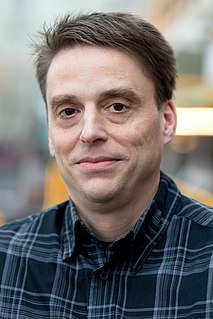 W
WJohn Harrison Watrous is a professor of computer science at the David R. Cheriton School of Computer Science at the University of Waterloo, a member of the Institute for Quantum Computing, an affiliate member of the Perimeter Institute for Theoretical Physics and a Fellow of the Canadian Institute for Advanced Research. He was a faculty member in the Department of Computer Science at the University of Calgary from 2002 to 2006 where he held a Canada Research Chair in quantum computing.
 W
WDavid Jeffrey Wineland is an American Nobel-laureate physicist at the National Institute of Standards and Technology (NIST) physics laboratory. His work has included advances in optics, specifically laser-cooling trapped ions and using ions for quantum-computing operations. He was awarded the 2012 Nobel Prize in Physics, jointly with Serge Haroche, for "ground-breaking experimental methods that enable measuring and manipulation of individual quantum systems".
 W
WPeter Zoller is a theoretical physicist from Austria. He is Professor at the University of Innsbruck and works on quantum optics and quantum information and is best known for his pioneering research on quantum computing and quantum communication and for bridging quantum optics and solid state physics.
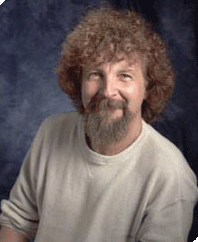 W
WWojciech Hubert Zurek is a Polish theoretical physicist and a leading authority on quantum theory, especially decoherence and non-equilibrium dynamics of symmetry breaking and resulting defect generation.